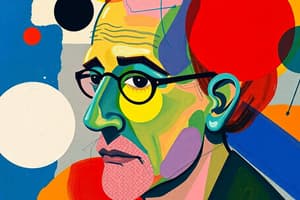Podcast
Questions and Answers
What was the main reason for the establishment of the ministry of basic education in 1979?
What was the main reason for the establishment of the ministry of basic education in 1979?
- To prepare for the implementation of the 8-4-4 system
- To reduce emphasis on exam oriented education
- To implement vocational and technical education
- Due to economic constraints (correct)
What was the purpose of the Mackay Commission?
What was the purpose of the Mackay Commission?
- To reduce emphasis on exam oriented education
- To implement the 8-4-4 system of education
- To investigate the feasibility of a second university in Kenya (correct)
- To establish a council on higher education
What was one of the recommendations of the Mackay Commission?
What was one of the recommendations of the Mackay Commission?
- To reduce the number of years of basic education
- To abolish the Parents Teachers Association
- To increase emphasis on exam oriented education
- To establish a council on higher education (correct)
What system of education was adapted as a result of the Mackay Commission?
What system of education was adapted as a result of the Mackay Commission?
What was the focus of the new curriculum contents as recommended by the Mackay Commission?
What was the focus of the new curriculum contents as recommended by the Mackay Commission?
What was another recommendation of the Mackay Commission?
What was another recommendation of the Mackay Commission?
What was the primary method of learning in traditional African education during pre-independence Kenya?
What was the primary method of learning in traditional African education during pre-independence Kenya?
What was the purpose of rites of passage in traditional African education?
What was the purpose of rites of passage in traditional African education?
What is the primary function of oral literature in traditional African education?
What is the primary function of oral literature in traditional African education?
How did traditional African education discourage bad habits and undesirable behavior in children?
How did traditional African education discourage bad habits and undesirable behavior in children?
What was the role of music in traditional African education?
What was the role of music in traditional African education?
What was the primary goal of productive work in traditional African education?
What was the primary goal of productive work in traditional African education?
What is the purpose of initiation in traditional African education?
What is the purpose of initiation in traditional African education?
What was the main difference between indigenous African education and the education brought by the missionaries?
What was the main difference between indigenous African education and the education brought by the missionaries?
What was a benefit of western education for some African children?
What was a benefit of western education for some African children?
Why did many Africans desire to learn the ways of Westerners?
Why did many Africans desire to learn the ways of Westerners?
What skill was provided by Western education?
What skill was provided by Western education?
Why was education seen as a means of family advancement?
Why was education seen as a means of family advancement?
What was a consequence of attending school?
What was a consequence of attending school?
What was the main focus of the education system after independence?
What was the main focus of the education system after independence?
Why did the post-independent government establish education commissions?
Why did the post-independent government establish education commissions?
What is the role of a teacher in the context of cultural transmission and change?
What is the role of a teacher in the context of cultural transmission and change?
What does the study of the history of education help us to appreciate?
What does the study of the history of education help us to appreciate?
What is one of the benefits of comparing the origins and development of educational ideas in different societies?
What is one of the benefits of comparing the origins and development of educational ideas in different societies?
Why is it important to understand the historical context of educational theories and practices?
Why is it important to understand the historical context of educational theories and practices?
What does the study of the history of education help us to understand?
What does the study of the history of education help us to understand?
What is the role of history in education?
What is the role of history in education?
What is one of the benefits of studying the history of education?
What is one of the benefits of studying the history of education?
What does the study of the history of education help us to achieve?
What does the study of the history of education help us to achieve?
What is the level of education that consists of Upper Primary and Lower Secondary?
What is the level of education that consists of Upper Primary and Lower Secondary?
What is the purpose of the assessment at the end of Grade 6?
What is the purpose of the assessment at the end of Grade 6?
How many years does a learner typically spend in University Education?
How many years does a learner typically spend in University Education?
What is the category of careers that includes Arts and Sports Sciences?
What is the category of careers that includes Arts and Sports Sciences?
What is the next level of education after Middle School?
What is the next level of education after Middle School?
What is the acronym of the organization responsible for administering assessments in Kenya?
What is the acronym of the organization responsible for administering assessments in Kenya?
What is the final level of education before a learner can engage in entrepreneurial business?
What is the final level of education before a learner can engage in entrepreneurial business?
What consists of both primary and secondary education?
What consists of both primary and secondary education?
Flashcards are hidden until you start studying
Study Notes
Importance of Studying Educational Theories and Practices
- Encourages teachers to examine, evaluate, and modify cultural heritage to promote intelligent cultural transmission and change.
- Fosters a critical attitude towards present theories and practices, enabling teachers to adopt a more informed approach.
Understanding Educational Systems
- History of education provides a narrative of the origins, growth, and development of educational institutions, methods, concepts, aims, and practices.
- It helps appreciate the road travelled by education to reach its current state.
Making Comparisons within a Historical Perspective
- History of education enables one to draw comparisons of the origins and development of different ideas, practices, and theories in various societies.
- It helps formulate better ideas, patterns, and principles, providing a broader perspective.
Traditional African Education in Pre-Independence Kenya
- Methods used in traditional African education included constant correction, initiation, oral literature, dance, and punishment.
- Rites of passage marked the stages of a person's life, teaching the young various habits, attitudes, values, and skills.
- Oral literature, including myths, legends, and folk tales, played a significant role in inculcating discipline, values, and personality development.
- Traditional learning involved the use of deterrents, such as punishment, to conform to moral customs and standards of behavior.
Reasons why Western Education Gained Favor among Africans before Independence
- Some African children who attended schools were employed.
- Western education was seen as a gate pass to urban life and an avenue to escape poverty.
- It provided skills to Africans, such as reading, writing, and hygiene.
- Education was seen as a family advancement and better prospects.
- It made outcasts accepted and recognized in society.
- School attendance exempted one from paying taxes, forced labor.
Education Commissions after Independence
- The African post-independent government took steps to rectify the education system, focusing on social and economic growth.
- The Mackay Commission (1981) was established to prepare a plan for the establishment of a second university in Kenya.
- The commission recommended setting up a technically oriented university, reducing emphasis on exam-oriented education, and adapting the 8-4-4 system of education.
Development of Basic Education after Independence in Kenya
- The ministry of basic education was established in 1979 to implement nine years of basic education.
- The education system was reformed to enhance social and economic growth.
- The 8-4-4 system of education was adapted, with a focus on continuous assessment and vocational and technical education.
- The establishment of a council on higher education was recommended to accredit universities.
Studying That Suits You
Use AI to generate personalized quizzes and flashcards to suit your learning preferences.




